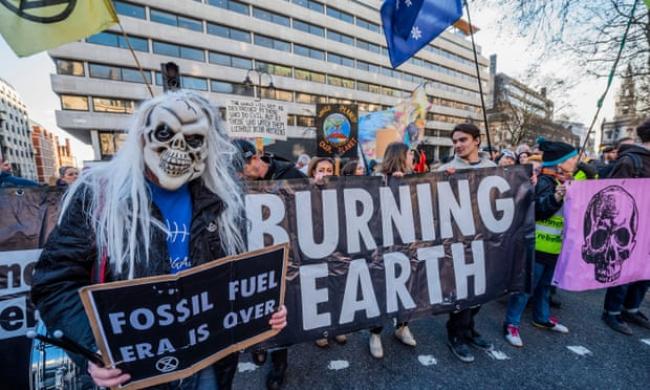Articles Menu

Jan. 15, 2020
Priti Patel probably thought she was helping when she tried to defend counter-terrorism police from the condemnation that followed last week’s story in the Guardian revealing the inclusion of Extinction Rebellion (XR) in a guide on supposed “extreme or violent ideologies”.
The document has apparently now been withdrawn. Nevertheless, the home secretary’s insistence that the police always make decisions based on the “risk to the public, security risks, security threats” does inevitably lead to an obvious, unanswered question. If she is right, how exactly did Counter Terrorism Policing South East (CTPSE), which wrote and published the guide, manage to make what even it admits was a significant “error of judgment”?
The answer lies in how alleged risks posed by protest groups are assessed. To begin with, it may surprise many that there is no legal definition of what “domestic extremism” even means, leaving the police with complete discretion in deciding what it covers. “Extremism” and “domestic extremism” are used interchangeably by the police to differentiate from terrorism. The current criteria is so broad and ambiguous that David Anderson, a former independent reviewer of terrorism legislation, has described it as “manifestly deficient” and last summer, the Home Office finally confirmed it had stopped using such terms. The police, as we have seen, have not.
In practice, decisions about who is labelled an “extremist” are made in secret by police units concerned more about their ideas of security and defending public order than about human rights and by officers who are often deeply antagonistic towards protesters challenging the corporate and political orthodoxies of the day.
The full extent of such hostility was set out in a Policy Exchange report on XR co-authored last year by Richard Walton, the former head of the Metropolitan police’s counter-terrorism command. Walton claimed, extraordinarily, that what he saw as “the underlying extremism of the campaign” had been “largely obscured from public view by what many see as the fundamental legitimacy of their stated cause”.
In turn, this classification provides police with the justification for intensive surveillance, which can be extremely intrusive and intimidating.
XR is far from the first environmental campaign to receive this kind of police attention. More than a decade ago the anti-aviation group Plane Stupid was targeted and it is nine years since Mark Kennedy was exposed as an undercover police officer who infiltrated annual climate camp gatherings.
However, the most recent targets have been opponents of fracking, with sustained surveillance from regional counter-terrorism units. Netpol, the organisation I run to monitor public order, protest and street policing, has documented the experiences of the anti-fracking movement for five years and these provide an important reminder of why no matter what promises are made now, there are no guarantees the police will stop categorising XR as “extremists” in the future.
In December 2016, negative media coverage forced the Home Office to declare that “support for anti-fracking is not an indicator of vulnerability” to extremism. This followed reports about City of York council and a school in North Yorkshire including anti-fracking campaigns in their Prevent counter-terrorism advice. However, months later, leaked “counter-terrorism local profiles” – again the work of the regional police unit in the south-east of England – identified protests in Sussex as a “priority theme ... where increased tensions or vulnerabilities may exist”.
As recently as October 2019, there was evidence of Surrey county council claiming local police had advised it that anti-fracking activities were among their “main extremist areas of concern” (alongside the far right) and that any protest, no matter how peaceful, was “extremist”.
It is clear that once the current controversy dies down, it will be only a matter of time before XR and other climate activists are again labelled as an “extremist risk”. The group has indicated it may bring legal action to have its name removed from any list but perhaps XR would be better served by putting its weight behind the call for the complete abolition of the “domestic extremist” label for everyone.
To protect freedom to protest, the government also needs to completely separate secretive counter-terrorism units from the policing of non-violent protests. They have no business involving themselves in legitimate political activity.
Until this happens, it seems unlikely anyone will ever be held to account for “errors of judgment”, no matter how potentially damaging the consequences are for those labelled a safeguarding risk. Officers will simply carry on, as they have for decades, trying to find imagined threats in any new and emerging protest movement and then spying on and disrupting their campaigns. It’s time this finally stopped for good.
• Kevin Blowe is coordinator of the Network for Police Monitoring
[Top photo: An Extinction Rebellion protest outside the Australian High Commission in London demonstrates against the attitude of the Australian government to climate change. Photograph: Guy Bell/Rex/Shutterstock]